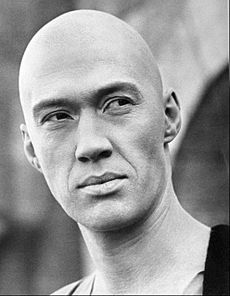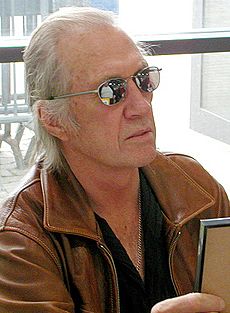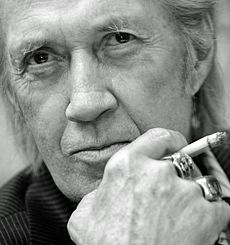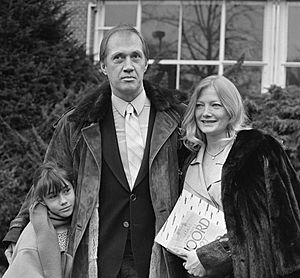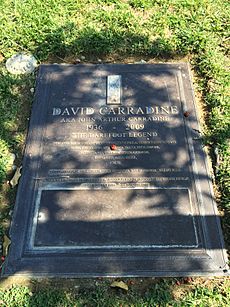David Carradine facts for kids
Quick facts for kids
David Carradine
|
|
|---|---|
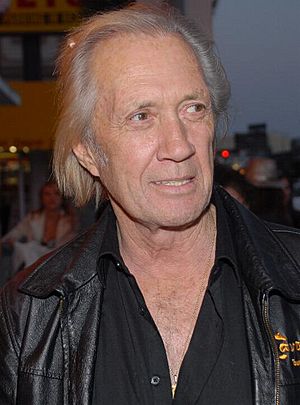
Carradine in 2008
|
|
| Born |
John Arthur Carradine Jr.
December 8, 1936 |
| Died | June 3, 2009 (aged 72) Bangkok, Thailand
|
| Body discovered | Swissôtel Nai Lert Park Hotel, Bangkok, Thailand |
| Resting place | Forest Lawn Memorial Park, Hollywood Hills |
| Alma mater |
|
| Occupation | Actor |
| Years active | 1963–2009 |
|
Works
|
Filmography |
| Spouse(s) |
|
| Partner(s) | Barbara Hershey (1968–1975) |
| Children | 3, plus 4 stepchildren by his last wife |
| Parent(s) |
|
| Relatives |
|
| Family | Carradine |
David Carradine (born John Arthur Carradine Jr.; December 8, 1936 – June 3, 2009) was an American actor. He was famous for playing characters who knew martial arts. Many people remember him as the star of the 1970s TV show Kung Fu. In this show, he played Kwai Chang Caine, a peaceful Shaolin monk traveling through the American Old West. He also played the main character in both Kill Bill films.
David Carradine came from the Carradine family, a well-known group of actors. His father, John Carradine, had a long acting career. David Carradine appeared in over 100 movies during his career, which lasted more than six decades. He was nominated for a Golden Globe Award and an Emmy Award for his role in Kung Fu. He also received three more Golden Globe nominations for his work in Bound for Glory (1976), North and South (1985), and Quentin Tarantino's Kill Bill: Volume 2. For Kill Bill: Volume 2, he won the Saturn Award for Best Supporting Actor.
Even after his death, films starring Carradine continued to be released. These movies included action, drama, horror, martial arts, and westerns. Besides acting, Carradine was also a director and a musician. Because of his role in Kung Fu, he also studied martial arts. On April 1, 1997, David Carradine received a star on the Hollywood Walk of Fame.
Contents
- Early Life and Education
- Acting Career in Film and Television
- Starting Out in TV and Movies
- First Big Break on Broadway
- Shane and Supporting Roles
- Boxcar Bertha and Directing Debut
- Kung Fu TV Series
- Becoming a Film Star
- Directing Americana and Later Roles
- North and South Miniseries
- Action Films and Kung Fu: The Legend Continues
- Kill Bill Films
- Final Years and Posthumous Releases
- Martial Arts Skills
- Music Career
- Personal Life
- Death
- Filmography
- Awards and Honors
- Discography
- Images for kids
- See also
Early Life and Education
Carradine was born John Arthur Carradine Jr. on December 8, 1936, in Hollywood, California. He was the oldest child of actor John Carradine and Ardanelle Abigail Carradine. He had several half-siblings, including Bruce, Keith, Christopher, and Robert Carradine. Many of his family members also became actors.
David had a challenging childhood, as his parents divorced when he was young. After his parents' divorce, David lived with his father in New York City. On December 25, 1947, David appeared in a live TV show called A Christmas Carol with his father. For a few years, David spent time in different schools and homes. He also often joined his father at summer theater performances.
School and College Years
Eventually, David Carradine returned to California. He graduated from Oakland High School. He then attended Oakland Junior College (now Laney College) for one year. Later, he transferred to San Francisco State College. There, he studied drama and music. He also wrote music for plays while working small jobs and starting his acting career.
After leaving college, Carradine spent some time in San Francisco and southern California. In 1960, Carradine joined the United States Army. While in the Army, he helped create a theater group. He met Larry Cohen, who later cast him in the movie Q, The Winged Serpent. In 1962, his daughter Calista was born. Carradine was honorably discharged after two years of service.
Acting Career in Film and Television
Starting Out in TV and Movies
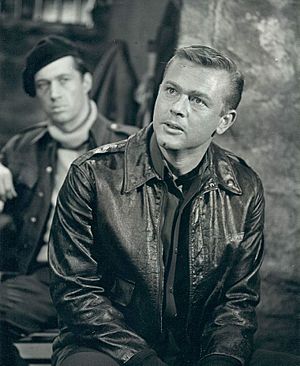
After leaving the Army, Carradine became serious about acting. In 1963, he made his TV debut on Armstrong Circle Theatre. He then appeared in other TV shows like Wagon Train and The Alfred Hitchcock Hour. In 1964, Carradine got a contract with Universal Studios. The studio gave him his first movie role in Taggart (1964), a western.
In May 1964, Carradine joined the Broadway play The Deputy. After the play ended, he continued to work in TV. He often played "greenhorns in Westerns and villains in thrillers."
First Big Break on Broadway
Carradine's first major acting opportunity came with his second Broadway play, The Royal Hunt of the Sun. This play was about the destruction of the Inca civilization. Carradine played Atahuallpa opposite Christopher Plummer. The play opened in October 1965 and was very successful. Carradine won a Theatre World Award for Best Debut Performance in 1965.
Shane and Supporting Roles
Carradine left Royal Hunt of the Sun in May 1966 to star in the TV series Shane. He played the main character in this western show. The show lasted 17 episodes. Carradine then found success as a supporting actor, mostly in Westerns. These included Heaven with a Gun (1969) and The Good Guys and the Bad Guys (1969).
He was unhappy playing villains and decided to stop. This led to him not working in Hollywood for a year.
Boxcar Bertha and Directing Debut
In 1972, he co-starred in Boxcar Bertha, one of Martin Scorsese's early films. This movie also starred Barbara Hershey, who was his partner at the time. Carradine also made his first movie as a director with You and Me. He starred in it alongside Hershey and his brothers Keith and Robert. This film was shot in 1972 but released in 1975.
Kung Fu TV Series
For three seasons, Carradine starred as the half-Chinese/half-American Shaolin monk Kwai Chang Caine in the ABC TV series Kung Fu (1972–1975). This role earned him nominations for an Emmy Award and a Golden Globe Award. Along with Bruce Lee movies, Kung Fu helped make martial arts popular in the West. Carradine's character also made the term "grasshopper" (meaning a student) well-known.
While working on Kung Fu, Carradine also appeared in Scorsese's Mean Streets (1973) and Robert Altman's The Long Goodbye. He also directed several episodes of Kung Fu.
Becoming a Film Star
After Kung Fu, Carradine played the racecar driver Frankenstein in Death Race 2000 (1975). This movie became a cult classic. In 1976, he received praise for playing folksinger Woody Guthrie in Bound for Glory. For this role, he won an award and was nominated for a Golden Globe.
Carradine then starred in The Serpent's Egg (1977). This was one of only two English-language films by Swedish director Ingmar Bergman. In 1978, he played four roles in Circle of Iron, which were originally meant for Bruce Lee. Carradine considered this one of his best works.
In The Long Riders (1980), Carradine starred with his half-brothers Keith and Robert Carradine. They played the Younger Brothers. Carradine played Cole Younger in this memorable role.
Directing Americana and Later Roles
Carradine directed another film called Americana (1981). He also starred in, produced, and edited this movie. It took ten years to finish because of money issues. The film won an award at the Director's Fortnight at Cannes.
Carradine continued to appear in TV shows and movies. He was the villain in Lone Wolf McQuade (1983) with Chuck Norris. He also starred in TV movies like Jealousy (1984).
North and South Miniseries
Carradine gained attention in 1985 for his role in North and South. This miniseries was about the American Civil War. He played the character Justin LaMotte and was nominated for a Golden Globe.
Carradine returned to play Caine in Kung Fu: The Movie (1986) for TV. This movie was the acting debut of Bruce Lee's son, Brandon Lee.
Action Films and Kung Fu: The Legend Continues
Carradine continued to be in demand for action films, many of which went straight to video. He starred in Armed Response (1986) and Sonny Boy (1989), where he also sang. He made several films for producer Roger Corman.
In 1992, Carradine returned to the role of Caine in Kung Fu: The Legend Continues. This led to a new TV series that ran from 1993 to 1997. Carradine also worked as a producer and directed an episode. In 1997, he received a star on the Hollywood Walk of Fame.
He continued to appear in many films and TV shows, often in supporting roles. In 2001, he appeared in an episode of Queen of Swords. He also made a guest appearance in an episode of Lizzie McGuire, working with his brother Robert.
Kill Bill Films
Carradine became famous again when he was cast in Quentin Tarantino's Kill Bill movies: Kill Bill: Volume 1 (2003) and Kill Bill: Volume 2 (2004). He played Bill, a master assassin. His performance earned him a Golden Globe Award nomination and a Saturn Award for Best Supporting Actor.
In 2005, David Carradine took over as host of Wild West Tech on the History Channel. He also appeared as Clockwork, the ghost of time, in the animated series Danny Phantom. He had a cameo in Epic Movie (2007) and supported Rob Schneider in Big Stan (2007). In 2008, he starred in the TV movie Kung Fu Killer, playing a Chinese martial arts master similar to his Caine character.
Final Years and Posthumous Releases
Carradine's last performances included a role in the music video for the Jonas Brothers' song Burnin' Up (2008). He also appeared in films like Crank: High Voltage (2009).
At the time of his death in 2009, Carradine had about a dozen films that were still being finished. Most of these were small roles in independent films. He made one last film for Corman, Dinocroc vs. Supergator (2010). Carradine also had a minor role in Yuen Woo-ping's Chinese kung fu movie True Legend.
Carradine co-produced a documentary about a guitar maker named Stuart Mossman. This film, The Legend of Stuart Mossman: A Modern Stradivari, was identified as his last film appearance. It featured David, Keith, and Robert Carradine playing music on Mossman guitars.
Martial Arts Skills
When David Carradine was first cast in Kung Fu, he didn't know much about kung fu. He used his experience as a dancer for the role. He also knew about sword fighting, boxing, and street fighting. For the TV series, David Chow and later Kam Yuen taught him kung fu.
Carradine never called himself a master of martial arts. Instead, he saw himself as someone who helped share kung fu with others. By 2003, he had enough martial arts knowledge to create and star in videos about T'ai chi and Qigong. In 2005, Carradine visited the Shaolin Monastery in Henan, China. The abbot, Shi Yǒngxìn, thanked Carradine for helping to promote the Shaolin Monastery and kung fu culture.
Music Career
Besides acting, Carradine was also a musician. He sang and played the piano, guitar, and flute. In 1970, he performed songs in an episode of Ironside. He recorded an album called Grasshopper, released in 1975.
His musical talents often appeared in his movies. He sang several Woody Guthrie songs for the movie Bound for Glory. For the Kung Fu series, he made flutes from bamboo. He later made flutes for the movie Circle of Iron, and played one in Kill Bill. Carradine wrote and performed theme songs for movies like Americana and Sonny Boy. The first line from the Sonny Boy theme is even on his headstone. He also wrote music for You and Me. He and his brother, Robert, also performed with a band called the Cosmic Rescue Team.
Personal Life
In 1960, Carradine married Donna Lee Becht, whom he met in high school. Their daughter Calista was born in April 1962. The marriage ended in 1968.
In 1968, Carradine met actress Barbara Hershey. They lived together until 1975 and appeared in films like Boxcar Bertha. In 1972, their son, Free, was born.
In February 1977, Carradine married Linda Gilbert. Their daughter, Kansas, was born in 1978. This marriage ended in divorce, as did his next two marriages to Gail Jensen and Marina Anderson.
On December 26, 2004, Carradine married Annie Bierman. Through this marriage, he gained three stepdaughters and a stepson. In one of his last interviews, Carradine said he was in "excellent shape" at 71, thanks to a good diet and young friends.
Death
David Carradine died on June 4, 2009, at the age of 72.
Filmography
Awards and Honors
- 1966: Winner – Theatre World Award, for The Royal Hunt of the Sun
- 1973: Nominee – Primetime Emmy Award. Outstanding Actor in a Leading Role (Drama Series), for Kung Fu
- 1974: Nominee – Golden Globe Awards. Best Television Actor - Drama Series, for Kung Fu
- 1974: Winner – TP de Oro, Spain. Best Foreign Actor, for Kung Fu
- 1976: Winner – National Board of Review Award. Best Actor, for Bound for Glory
- 1977: Nominee – Golden Globe Awards. Best Actor - Motion Picture Drama, for Bound for Glory
- 1986: Nominee – Golden Globe Awards. Best Supporting Actor - Television, for North and South
- 1997: Honoree – Gold Star on the Hollywood Walk of Fame, Television
- 1998: Honoree – Golden Boot Award (with brothers Keith and Robert)
- 2004: Winner – The Golden Schmoes award. Best Supporting Actor, for Kill Bill (V2)
- 2004: Honoree – Capri, Hollywood International Film Festival, Capri Legend Award.
- 2005: Winner – Saturn Award. Best Supporting Actor, for Kill Bill: Volume 2
- 2005: Nominee – Golden Globe Awards. Best Supporting Actor - Motion Picture, for Kill Bill (Vol.2)
- 2005: Nominee – People’s Choice Awards. Favorite Villain Movie Star, for Bill in Kill Bill - Vol. 2.
- 2005: Nominee – Satellite Award, Best Supporting Actor - Drama, for Kill Bill: Volume 2
- 2008: Honoree – Bronze plaque on the Walk of Western Stars
- 2013: Honoree – Hollywood Museum, Exhibition “The Barefoot Legend: David Carradine - a Contemporary Renaissance Man”
- 2014: Inductee – Martial Arts History Museum, Hall of Fame
Discography
- You And Me (Vinyl single). n.d.: Billy. c. 1973.
- Jim Helms, David Carradine, Keye Luke, Philip Ahn, Radames Pera (1973). Kung Fu - Music & Dialogue From The Warner Bros. T.V. Series (Vinyl album). United States: Warner Bros. Records.
- Grasshopper (Vinyl album). United Kingdom: Jet Records. 1975.
- Around (Vinyl single). United Kingdom: Jet Records. 1975.
- Cosmic Joke (Vinyl single). United Kingdom: Jet Records. 1976.
- Woody Guthrie, Leonard Rosenman, David Carradine (1976). Bound For Glory - Original Motion Picture Score (Vinyl album). Canada: United Artists Records.
- Jesus Christ (Vinyl single). Germany: United Artists Record. 1976.
- David Carradine, Gail Jensen, Michael Shanklin (1983). Señor Problemas (Troublemaker) (Vinyl single). Argentina: MICSA.
- David Carradine, Michael Shanklin, Tamila Jensen, Gail Jensen (1985). Walk the Floor (Vinyl single). United States: Coop Records.
- David Carradine's Mata Hari Suite. Music for The Film (CD). United States: ZumaGold. c. 1990.
- David Carradine As Is (CD). United States: Panartist. 2001.
Images for kids
See also
 In Spanish: David Carradine para niños
In Spanish: David Carradine para niños
 | Toni Morrison |
 | Barack Obama |
 | Martin Luther King Jr. |
 | Ralph Bunche |


